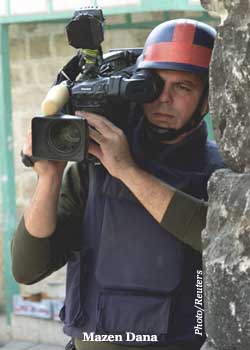Year after year, Dana deftly navigated one of the most inhospitable assignments a journalist could undertake -- covering his turbulent hometown, Hebron, and other West Bank sites. He anonymously documented events for the world to see, encountering a frightening array of dangers along the way. I remember sipping tea with him outside the Ibrahimi Mosque and the Cave of the Patriarchs three years ago in Hebron as he nonchalantly described the violence, lifting up a pant leg to show off an array of scars and bruises. In the span of several weeks, he had been wounded by a rubber bullet, his head was slammed in an ambulance door by an Israeli policeman and he was knocked unconscious by Jewish settlers. Through a combination of skill, savvy and good fortune, Dana always managed to endure. But his invincibility came to a sudden end Aug. 17 outside Baghdad at Abu Ghraib prison when a machine gunner atop a U.S. tank unleashed a burst of fire at him as he filmed the tank's approach. The soldier who fired mistook Mazen's camera for a rocket-propelled grenade launcher, U.S. officials said.
Journalists working in the area reported that no hostilities were taking place at the time and that Dana was standing in the open, in the light, when the soldier fired without warning. "There were no trees, he wasn't sneaking around, or climbing the walls of the prison. He was in the middle of the road," one photographer said. Mazen Dana's death raises serious questions about the U.S. rules of engagement in Iraq. Are the necessary guidelines in place so that soldiers distinguish between combatants and noncombatants? As one journalist said, the soldiers are "young, they're scared, and they're getting shot at and having bombs exploded on them everyday. Under these circumstances, they're all too ready to shoot first and ask questions later. Ultimately, it's a command problem." Yet, to protect "operational security," the U.S. military will not discuss the rules of engagement, the guidelines that govern when soldiers shoot or hold their fire. This only makes it more difficult for journalists to assess the risks and prepare themselves to do their work safely. U.S. military spokesman Col. Guy Shields said after Dana's death that U.S. forces would "do everything in our power to make sure something like this does not happen again," adding that "if changes need to be made, they will be made." That would be a welcome development. At the least, the military should issue guidelines for journalists -- and civilians -- to follow when approaching a checkpoint or operating in an area under military control. Iraq remains a dangerous and unpredictable place, for U.S. troops, who are obliged to defend themselves, but also for journalists. Twelve have died in action, five from U.S. fire. And the journalists, like the soldiers, are there for the duration. "Words and images are a public trust," Dana said when he was honored for his courageous work in 2001. "For this reason I will continue with my work regardless of the hardships and even if it costs me my life." That Dana's work ultimately did cost him his life should not be the end of the story. A transparent, thorough inquiry should determine why he was killed and, equally important, what can be done to prevent such deaths in the future. It would be a fitting tribute to Dana were a sliver of good to come out of his death. © Joel Campagna |
|
|
Write a Letter
to the Editor |
 I
I